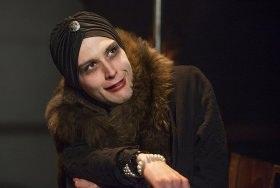A Dashing Fellow
Adaptations of Nabokov onstage have had a somewhat difficult reception. As a writer he is most well known for his novels, in particular 'Lolita' (1955) with which he found worldwide fame. After writing a small number of plays he soon rejected his own skills as a dramatist, claiming it wasn't in his nature. Instead of attempting a single stage adaptation, Belka Productions have brought together three of his tales into one, creating a finely tuned and thoroughly successful piece of new writing.
We are reminded instantly of Isherwood's Berlin stories as the devilishly enigmatic Frau Monde begins the piece with a direct address to the audience a la the Emcee in Cabaret, instantly setting the tone and allowing the comedy to be established from the beginning - something that is vital for these three stories to engage. We are then presented with three very different yet thoroughly related narratives of characters in exile, looking for love, searching for a loved one or seeking a more base carnal desire.
Each of the central characters are almost purposefully two-dimensional, and it is difficult to invest with any one particular journey. The adaptation however is far from surface level, and the three separate narratives are carefully introduced so each complements the other. Rather than seeing three separate strands, writers Rosy Benjamin and Ben Maier have created a brand new composite piece that feels like a cohesive, original and thoroughly engaging work.
Part of the joy of this slick and professional production comes from Simon Eves' clean, sharp and tight direction. Considering the development of the writing period, Eves manages to focus the narratives firmly and present them in a clear, defined and invigorating manner. He handles each character with care and uses the confines of the space to his advantage in guiding the audience through the piece with intelligent and considered choices. His work is enhanced by efficient yet effective designs by Agnes Treplin who creates one central platform from which each story can quickly develop. Using a multifunctional steel cube, a train carriage becomes the primary setting along with a heightened, yet never overblown atmosphere.
The ensemble cast each give committed and well defined performances, in particular the male characters. Joel Gorf's bold, rich voice is commanding yet seductive, allowing him to bring much needed light and shade to womanizer Konstantin. He is finely balanced against Edward Cole's physically engaging Edwin, and the impressive central performance by Peter Clements as Frau Monde, who captures the audience from the opening seconds and never lets them go, through his outstanding delivery.
This is a thoroughly original and fascinating piece that deserves a wider audience. With some fine tuning in the exposition and some swifter changes of pace throughout, this has the potential to reinvigorate interest in Nabokov's work onstage.
Originally published on
